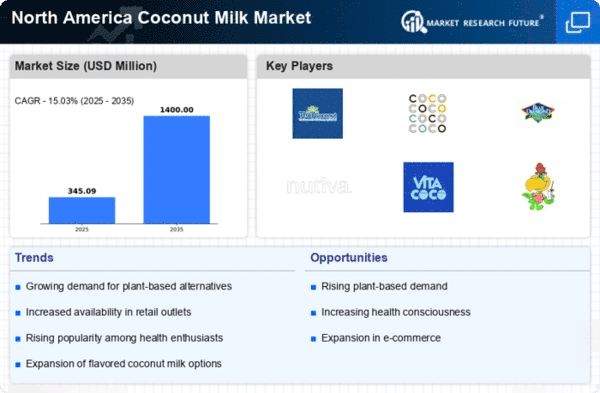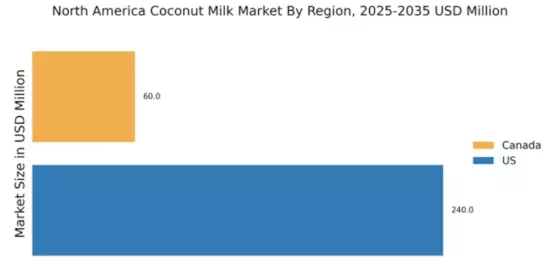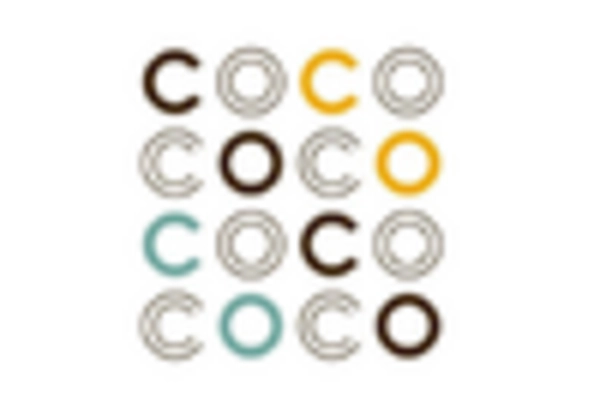Rise of Vegan and Plant-Based Diets
The rise of veganism and plant-based diets in North America is significantly influencing the coconut milk market. As more consumers adopt these lifestyles, the demand for dairy substitutes has escalated. Coconut milk serves as a versatile ingredient in various culinary applications, appealing to those seeking to eliminate animal products from their diets. Market Research Future indicates that the plant-based food sector is expected to reach $74 billion by 2027, with coconut milk playing a crucial role in this growth. The coconut milk market is poised to capitalize on this trend, as it offers a creamy texture and rich flavor that enhances both sweet and savory dishes, making it a staple for many plant-based consumers.
Health Consciousness Among Consumers
The increasing awareness of health and wellness among consumers in North America appears to be a primary driver for the coconut milk market. As individuals seek healthier dietary options, the demand for plant-based alternatives has surged. Coconut milk, known for its low calorie content and absence of lactose, aligns well with the preferences of health-conscious consumers. According to recent data, the market for dairy alternatives, including coconut milk, is projected to grow at a CAGR of approximately 10% through 2026. This trend indicates a shift towards non-dairy options, as consumers prioritize nutrition and health benefits. The coconut milk market is likely to benefit from this growing segment, as more individuals incorporate coconut milk into their diets for its perceived health advantages.
Culinary Trends Favoring Coconut Milk
Culinary trends in North America are increasingly favoring the use of coconut milk, which is becoming a popular ingredient in both home cooking and professional kitchens. The versatility of coconut milk allows it to be used in a wide range of dishes, from smoothies to curries, appealing to diverse culinary preferences. The coconut milk market is benefiting from this trend, as chefs and home cooks alike experiment with coconut milk in innovative recipes. Additionally, the rise of food blogs and social media platforms has contributed to the popularity of coconut milk, as influencers showcase its use in various dishes. This trend suggests a sustained interest in coconut milk, potentially leading to increased sales and market expansion.
Consumer Preference for Clean Label Products
The growing consumer preference for clean label products is a notable driver for the coconut milk market. As consumers become more discerning about ingredient transparency, they are increasingly seeking products with minimal additives and preservatives. Coconut milk, often marketed as a natural and wholesome alternative, aligns well with this trend. The coconut milk market is likely to see growth as brands emphasize their commitment to clean labeling and organic sourcing. Recent surveys indicate that nearly 70% of consumers are willing to pay a premium for products that are free from artificial ingredients. This shift in consumer behavior suggests that the coconut milk market could experience a significant boost as brands adapt to meet these evolving preferences.
Increased Availability of Coconut Milk Products
The expansion of retail channels and online platforms has led to increased availability of coconut milk products across North America. Consumers now have easier access to a variety of coconut milk brands and formulations, including organic and flavored options. This accessibility is crucial for the coconut milk market, as it allows consumers to explore and incorporate coconut milk into their daily routines. Recent statistics suggest that the retail sales of coconut milk have risen by over 15% in the past year, reflecting a growing consumer base. The convenience of purchasing coconut milk through various channels, including supermarkets and e-commerce, is likely to further drive market growth, as consumers seek out convenient and diverse options.


















